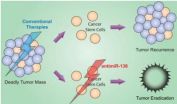Review finds some evidence for 'chemo brain' in breast cancer survivors, Moffitt Cancer Center says
On average, deficits are slight and limited to verbal ability and visuospatial skills
2012-09-04
(Press-News.org) A large meta-analysis conducted by researchers at Moffitt Cancer Center has concluded that breast cancer patients treated with chemotherapy are at risk for mild cognitive deficits after treatment. The meta-analysis, or analytic review of previously published studies, found that study participants on average had mild impairments in verbal abilities (such as difficulty choosing words) and visuospatial abilities (such as getting lost more easily). The study noted that cognitive functioning varies across survivors, with some reporting no impairments and others reporting more severe or pervasive deficits.
The study was published in a recent issue of the Journal of Clinical Oncology. The research was supported in part by the National Cancer Institute, part of the National Institutes of Health, through grant number K07 CA138499.
"The objective of our analysis was to clarify existing research on cognitive functioning in patients who had received standard dose chemotherapy for breast cancer at least six months previously," said study lead author Heather S.L. Jim, Ph.D., an assistant member at Moffitt whose research focuses on the psychosocial and behavioral aspects of cancer survivorship. "Earlier studies had reported conflicting evidence on the severity of cognitive deficits, especially over the long term."
Although this is an active area of research, an overall analysis of the studies had not been performed since 2006, explained the researchers.
"Our analysis indicated that patients previously treated with chemotherapy performed significantly worse on tests of verbal ability than individuals without cancer," noted co-author Paul B. Jacobsen, Moffitt senior member and associate center director of Population Sciences. "In addition, patients treated with chemotherapy performed significantly worse on tests of visuospatial ability than patients who had not had chemotherapy."
"Breast cancer patients treated with chemotherapy who have subsequent cognitive deficits should be referred to a neuropsychologist for evaluation and management of the deficits," Jim said. "Management usually involves developing an awareness of the situations in which their cognitive difficulties are likely to arise so that they can come up with strategies to compensate. Research shows that such strategies can make a big difference in daily life when cognitive difficulties do arise."
###
About Moffitt Cancer Center
Located in Tampa, Moffitt is one of only 41 National Cancer Institute-designated Comprehensive Cancer Centers, a distinction that recognizes Moffitt's excellence in research, its contributions to clinical trials, prevention and cancer control. Since 1999, Moffitt has been listed in U.S. News & World Report as one of "America's Best Hospitals" for cancer. With more than 4,200 employees, Moffitt has an economic impact on the state of nearly $2 billion. For more information, visit MOFFITT.org, and follow the Moffitt momentum on Facebook, twitter and YouTube.
Media release by Florida Science Communications
END
ELSE PRESS RELEASES FROM THIS DATE:
2012-09-04
1. A*STAR scientists have identified a biomarker of the most lethal form of brain tumours in adults- glioblastoma multiforme. The scientists found that by targeting this biomarker and depleting it with a potential drug, they were able to prevent the progression and relapse of the brain tumour.
2. This research was conducted by scientists at A*STAR's Institute of Medical Biology led by Dr Prabha Sampath, Principal Investigator, in collaboration with A*STAR's Bioinformatics Institute (BII), and clinical collaborators from Medical University of Graz, Austria, and National ...
2012-09-04
HOUSTON -- (Sept. 4, 2012) -- In the face of mounting evidence that cancer cells communicate, cooperate and even engage in collective decision-making, biophysicists and cancer researchers at Rice University, Tel Aviv University and Johns Hopkins University are suggesting a new strategy for outsmarting cancer through its own social intelligence.
"We need to get beyond the notion that cancer is a random collection of cells running amok," said Herbert Levine, co-director of Rice's Center for Theoretical Biological Physics (CTBP) and co-author of the cover article in this ...
2012-09-04
HOUSTON – (Sept. 4, 2012) – Like tiny ships finding port in a storm, carbon atoms dock with the greater island of graphene in a predictable manner. But until recent research by scientists at Rice University, nobody had the tools to make that kind of prediction.
Electric current shoots straight across a sheet of defect-free graphene with almost no resistance, a feature that makes the material highly attractive to engineers who would use it in things like touchscreens and other electronics, said Rice theoretical physicist Boris Yakobson. He is co-author of a new paper about ...
2012-09-04
Almost three quarters of disposed electrical household appliances in Spain are processed out of the Integrated Waste Management System (SIG). A study at the University of Salamanca exposes how many manufacturers are not registered in the established waste management system and avoid payment.
According to the European directive on waste electrical and electronic equipment, manufacturers of such products should recycle the waste they generate during their activity until reaching an annual level of 4 kg per inhabitant. However, in Spain the majority of unused equipment is ...
2012-09-04
The governance of Canada's massive Mackenzie River Basin holds enormous national but also global importance due to the watershed's impact on the Arctic Ocean, international migratory birds and climate stability, say experts convening a special forum on the topic.
"Relevant parties in western Canada have recognized the need for a multi-party transboundary agreement that will govern land and water management in the Mackenzie River watershed. Successful collaboration will effectively determine the management regime for a watershed covering 1.8 million square kilometers or ...
2012-09-04
1. No Nutritional or Safety Differences Between Organic and Conventional Foods
There is generally no difference in nutritional value or risk for bacterial contamination between organic and conventional foods, according to a new study being published in Annals of Internal Medicine, the flagship journal of the American College of Physicians (ACP). While the consumption of organic fruits and vegetables reduced exposure to any detectable pesticide residues by 30 percent, pesticide levels were generally within the allowable limits for safety.
Researchers conducted a systematic ...
2012-09-04
MINNEAPOLIS – People whose blood sugar is on the high end of the normal range may be at greater risk of brain shrinkage that occurs with aging and diseases such as dementia, according to new research published in the September 4, 2012, print issue of Neurology®, the medical journal of the American Academy of Neurology.
"Numerous studies have shown a link between type 2 diabetes and brain shrinkage and dementia, but we haven't known much about whether people with blood sugar on the high end of normal experience these same effects," said study author Nicolas Cherbuin, ...
2012-09-04
STANFORD, Calif. — You're in the supermarket eyeing a basket of sweet, juicy plums. You reach for the conventionally grown stone fruit, then decide to spring the extra $1/pound for its organic cousin. You figure you've just made the healthier decision by choosing the organic product — but new findings from Stanford University cast some doubt on your thinking.
"There isn't much difference between organic and conventional foods, if you're an adult and making a decision based solely on your health," said Dena Bravata, MD, MS, the senior author of a paper comparing the nutrition ...
2012-09-04
Tigers don't have a reputation for being accommodating, but a new study indicates that the feared and revered carnivores in and around a world-renowned park in Nepal are taking the night shift to better coexist with their human neighbors.
The revelation that tigers and people are sharing exactly the same space – such as the same roads and trails – of Chitwan National Park flies in the face of long-held convictions in conservation circles. It also underscores how successful conservation efforts need sciences that takes into account both nature and humans.
"As our planet ...
2012-09-04
While exchanging favors with others, humans tend to think in terms of tit-for-tat, an assumption easily extended to other animals. As a result, reciprocity is often viewed as a cognitive feat requiring memory, perhaps even calculation. But what if the process is simpler, not only in other animals but in humans as well?
Researchers at the Yerkes National Primate Research Center, Emory University, have determined monkeys may gain the advantages of reciprocal exchange of favors without necessarily keeping precise track of past favors. Malini Suchak, a graduate student at ...
LAST 30 PRESS RELEASES:
[Press-News.org] Review finds some evidence for 'chemo brain' in breast cancer survivors, Moffitt Cancer Center says
On average, deficits are slight and limited to verbal ability and visuospatial skills





